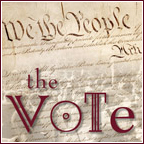IOWA CAUCUSES: Process Complicates, Elucidates Measure of Real Voter Support
UNIQUE SYSTEM BRINGS MUCH DIRECT CANDIDATE-VOTER INTERACTION, DESPITE INDIRECT MEASURE OF VOTER PREFERENCE
Often treated by mass media reporting as an "idiosyncratic" or "archaic" process, the Iowa caucuses are voters' first opportunity to weigh the value of the spectrum of candidates running for the office of the presidency. A caucus is not a vote, as such, but rather a discussion that ends with voters standing in the corner —quite literally— of the candidate they support.
The direct result of this process being privileged by coming first among all primary processes is that candidates must mingle with and meet and listen to individual voters across a sparsely populated state. While Iowa is not considered to be sociologically or demographically representative of the majority of the country, this one-to-one contact brings the candidates' rhetoric down to Earth and forces them to keep in touch with the needs and struggles of average citizens.
The Republican process differs from the Democratic process in that in August of the preceding year, the Republican Iowa Straw Poll measures caucus support for potential candidates, and the winner is often the winner in the election-year caucus contest. This year sees a possible inversion of that trend, where August 2007 Straw Poll winner Mitt Romney now trails Mike Huckabee 31% to 25% in rolling polls of "likely caucus goers" on the eve of the caucus.
The actual delegate selection process for Republicans is not very direct, as the precinct caucuses themselves result in non-binding voter "recommendations" to precinct delegates, who then select county delegates, who then select district delegates, who then officially select the statewide delegates that will cast their vote for a candidate at the Republican National Convention. [Full Story]



















No comments:
Post a Comment